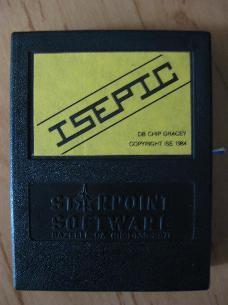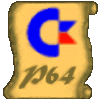ISEPIC: Difference between revisions
Count Zero (talk | contribs) No edit summary |
Count Zero (talk | contribs) No edit summary |
||
| Line 62: | Line 62: | ||
{{quote|These experiences quickly led to dismantling video game source code and household electronic hardware, and trying to use these devices for purposes other than originally intended. Hobby transformed into a business, and by the time he was a senior in high school Chip was running a small business called ''Innovative Software Engineering'' (ISE) from his bedroom. ISE made a software duplication hardware for the Commodore 64 computer called the ISEPIC (no relation to PICmicros). Within a year Chip sold 20,000 ISEPICs around the world, largely by word of mouth at local computer clubs and niche magazines.}} | {{quote|These experiences quickly led to dismantling video game source code and household electronic hardware, and trying to use these devices for purposes other than originally intended. Hobby transformed into a business, and by the time he was a senior in high school Chip was running a small business called ''Innovative Software Engineering'' (ISE) from his bedroom. ISE made a software duplication hardware for the Commodore 64 computer called the ISEPIC (no relation to PICmicros). Within a year Chip sold 20,000 ISEPICs around the world, largely by word of mouth at local computer clubs and niche magazines.}} | ||
''Starpoint Software'' sold ''ISEPIC'' for just about six months and we are not sure how many units entered the world but it was enough to worry some people. The cartridge came with monitor software (really worth a look!) and easened many tasks on a very basic level. Before actually ''breaking'' the currently frozen program it can be run again to see wether the saved snapshot would actually work. | ''Starpoint Software'' sold ''ISEPIC'' for just about six months and we are not sure how many units entered the world but it was enough to worry some people. The cartridge came with monitor software (really worth a look!) and easened many tasks on a very basic level. Before actually ''breaking'' the currently frozen program it can be run again to see wether the saved snapshot would actually work. Since all operations are done on a disc all of this is a very lengthy process and the common cycle of ''freeze, monitor inspect the memory, restart'' established with later cartridges was a real no-go with ''ISEPIC''. | ||
Many ''real crackers'' regarded the use of a freezing cartridge as being '''lame''' but interestingly we only found one ''demo'' | (TODO: explain free mem approach - in monitor bytes are shown inverted there) | ||
Many ''real crackers'' regarded the use of a freezing cartridge as being '''lame''' but interestingly we only found one ''demo'' so far by FAIF (''Federation againt ISEPIC & Freeze Frame''). On the other hand | |||
{{Infobox | {{Infobox | ||
Revision as of 01:23, 21 March 2010
| One switch to rule them all. |
|---|

|
| Designed by Chip Gracey |
ISEPIC (say "ice-pick") is an extraordinary hardware and software combination that is capable of copying virtually all memory-resident software regardless of the original protection scheme or storage medium are the first few words on the manual.
And for once you can believe in what that sentence stated in 1985. Freezing programs is the sole purpose ISEPIC was created for and it does it pretty well.
| File:Xxxx.gif ISEPIC Screenshots | |
| Technical Info | |
|---|---|
| RAM | 2 kbyte |
| Hardware features | 1 Switch |
| Manual | PDF: 11 pages - PNG: 1 page - v1.1 Upgrade Note |
| CRT ID | NONE |
| Programming | |
| Below text | |
Commercially distributed by Starpoint Software in likely June 1985 it vanished very quickly again by the end of 1985. The manual has the name of the hard- and software designer written all over it and nowadays the website of Parallax Inc. has an article on their origins explaining how Ken 'Chip' Gracey started that company and what he did before:
These experiences quickly led to dismantling video game source code and household electronic hardware, and trying to use these devices for purposes other than originally intended. Hobby transformed into a business, and by the time he was a senior in high school Chip was running a small business called Innovative Software Engineering (ISE) from his bedroom. ISE made a software duplication hardware for the Commodore 64 computer called the ISEPIC (no relation to PICmicros). Within a year Chip sold 20,000 ISEPICs around the world, largely by word of mouth at local computer clubs and niche magazines.
Starpoint Software sold ISEPIC for just about six months and we are not sure how many units entered the world but it was enough to worry some people. The cartridge came with monitor software (really worth a look!) and easened many tasks on a very basic level. Before actually breaking the currently frozen program it can be run again to see wether the saved snapshot would actually work. Since all operations are done on a disc all of this is a very lengthy process and the common cycle of freeze, monitor inspect the memory, restart established with later cartridges was a real no-go with ISEPIC.
(TODO: explain free mem approach - in monitor bytes are shown inverted there)
Many real crackers regarded the use of a freezing cartridge as being lame but interestingly we only found one demo so far by FAIF (Federation againt ISEPIC & Freeze Frame). On the other hand
Notes
Missing
- ISEPIC Schematics
Binaries
blablup.zip contains just the c64 binaries:
- Starpoints standard ISEPIC program which includes all the functionality (operating system and tools)
- XX De-Froster/Anti-ISEPICker/Onefile generators
- YY Anti-ISEPIC Demos
- A german ISEPICed manual for ISEPIC and ISEmon by SCA (Swiss Cracking Asses)
blablup.zip contains:
- all of the above
- ISEPIC Manual Scan (one PDF file)
- Isepic Manual Project64 Text
- ISEPIC fotos from retroport.de and AtariGuide
- Datasheets














